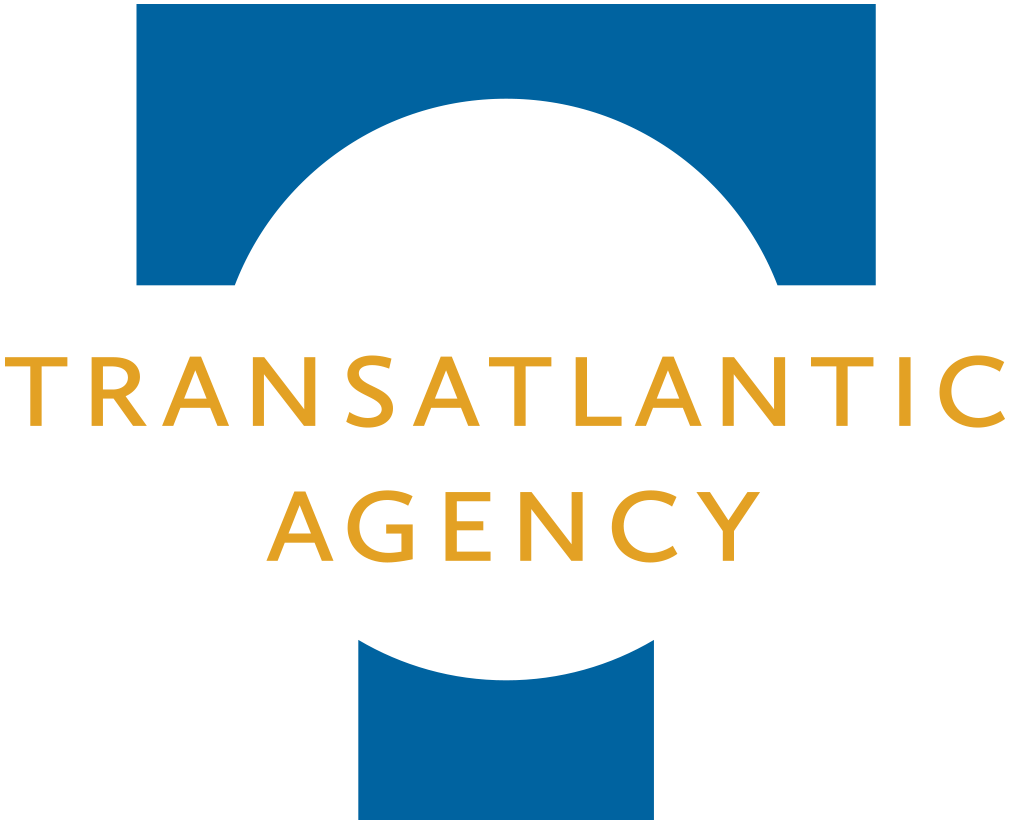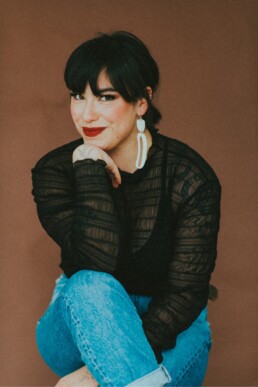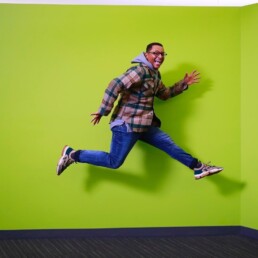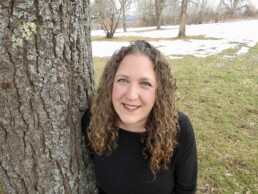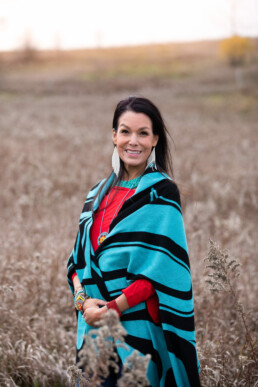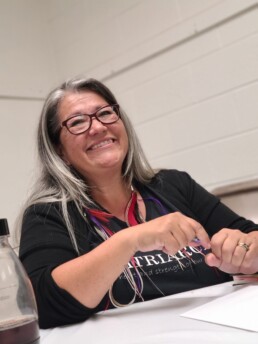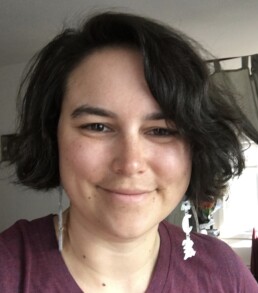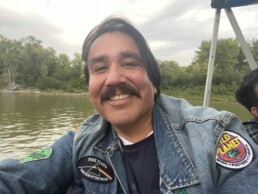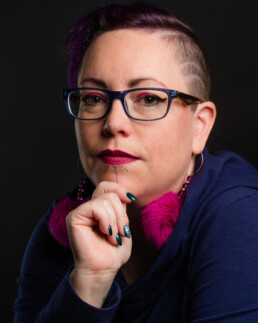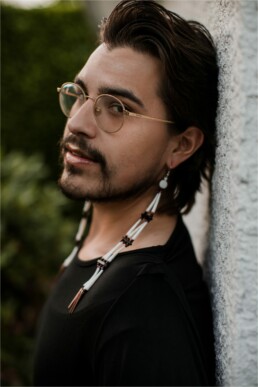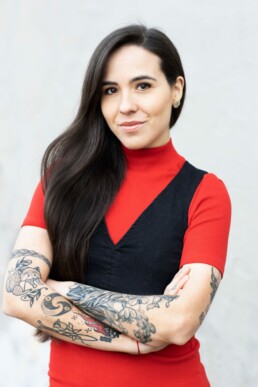Riley Yesno
Riley Yesno (she/her) is a queer Anishinaabe scholar, writer, and commentator, from Eabametoong First Nation and Thunder Bay, Ontario.
She is highly sought after for her words and analysis— called an “Indigenous powerhouse” by the Toronto Star, “one of the brightest young minds in Canada today” by jury members of the Canadian Journalism Foundation, and “a rising intellectual giant by the University of Toronto.
She has been a contributor and commentator for some of the largest media outlets in Canada and the world, including the New York Times, BBC World News, The Globe and Mail, and CBC National News. Riley has also travelled the globe speaking at internationally renowned institutions and events, including the UN climate negotiations, the Stockholm Forum on Gender Equality, TEDx stages, and many others.
She has taught Indigenous governance at Toronto Metropolitan University and is completing her PhD at the University of Toronto, where she is studying Indigenous / Canadian politics and is a Vanier Scholar. Riley is at work on the proposal for her first book of non-fiction, which will look critically at reconciliation in Canada, interwoven with her lived experience.
SPEAKING TOPICS
Beyond Reconciliation
It has been almost ten years since the Truth and Reconciliation Commission released its Final Report and launched Canada’s reconciliation project into the country’s political and social consciousness. What progress has been made? Where have we failed to take action? In this talk, Riley charts the trajectory of reconciliation from its inception to the present— highlighting Indigenous people’s critiques and the work we must all do to go beyond reconciliation as it has been pursued to date.
The Future is Indigenous
Too often, Indigenous people are wrongly viewed as ‘past people’— stuck in a time of pre-colonization and unable to adapt to the modern world. In this presentation, Riley shows that Indigenous people are, contrary to this racist belief, one of the most adaptable people out there— surviving apocalypse after apocalypse and adapting to every change brought on by colonization— Indigenous people have never let up on their commitment to realizing futures where we all thrive. Drawing on a concept called ‘Indigenous Futurism, ‘ Riley will explain how Indigenous art and activism are writing the story of a bold new future— today.
Indigenous Queerness: The Colonizers Brought the Closet
Over the past few decades in North America, the term ‘two-spirit’ (2S) has been increasingly recognized. As a queer Indigenous person herself, in this talk, Riley aims to break down what ‘two-spirit’ means, where it came from, and common misconceptions of the identity. She will also highlight how colonization has impacted all of our understandings of gender and sexuality and challenge audiences to decolonize their relationships to gender and sexuality as well— whether you’re Indigenous or not.
#LandBack
How did an internet joke turn into a rallying call for Indigenous action that spans across the continent? This is the story of Land Back: Building off of a longstanding history of refusal of the settler-colonial status quo, Land Back has become a point of connection for supporters of Indigenous self-determination and, increasingly, for those who see Indigenous leadership as the world’s greatest hope against climate destruction. This talk will outline how Land Back came to be and how it fits into the larger story of Indigenous contestation, provide examples of Land Back in action, and suggest ways we can all take part in the growing movement.
Lessons in Youth Leadership
Riley was only sixteen years old when she started taking up prominent leadership roles in Canada and around the world. From the Prime Minister’s table and UN negotiating rooms to grassroots youth movements, she’s learned many lessons about what it means to be a truly strong and honourable leader. Drawing on these experiences and teachings from an Anishinaabe worldview, this talk asks audiences to deeply consider questions like: How do you define leadership? How do you move through challenges with integrity? Is leadership about having a seat at the table, or should we be challenging the idea of ‘the table’ altogether?
Transforming Education for Indigenous Peoples
In Canada, we know that public education is not serving Indigenous people in the way it should, even as the statistics improve from year to year. From the closing of the last residential school in 1997 to now, Indigenous people continue to have high school graduation rates far below our non-Indigenous counterparts, and Indigenous representation in higher learning is even further behind. How do we overcome this? How can we decolonize the classroom— both the physical environment and the learning approach— so that all students not just pass, but feel empowered and seen by their education?
Murdered and Missing: Canada’s Failure to Protect Indigenous Women, Girls, and Queer People
The Final Report of the National Inquiry into Murdered and Missing Indigenous Women, Girls, and 2SLGBTQQIA+ people was released to the general public in 2019, but it had been a conversation in Indigenous communities for much longer than that. In this talk, Riley traces the history of injustice against Indigenous women, girls, and 2SLGBTQQIA+ people from the onset of colonization to now. The goal is to look beyond the data and the public reports and ask bigger questions like: How can we build communities and worlds that truly value non-violence, consent, and accountability?
To book Riley, please reach out to speakers@transatlanticagency.com
Harrison Mooney
Harrison Mooney is a best-selling memoirist and award-winning journalist from British Columbia, Canada. His debut memoir, Invisible Boy, has been shortlisted for two BC and Yukon Book Prizes, the prestigious Hurston/Wright Legacy Award, and was the winner of the 2023 Rakuten Kobo Emerging Writer Prize for nonfiction. Harrison’s work has also appeared in the New York Times, the Vancouver Sun, the Guardian, Yahoo and Maclean’s. He lives in East Vancouver with his family and family dog, Bootsy.
Speaking Topic
Black History in BC: From James Douglas to me
Harrison guides his audience through a survey of Black History in BC, beginning with James Douglas, the Father of British Columbia. Douglas kept his Blackness under wraps as best he could, serving as the British Crown and Hudson Bay Company’s primary contact in the new colony, “passing”, in the parlance, for a dark-skinned white man. Nevertheless, he was instrumental in welcoming nearly 800 racialized settlers, B.C.’s Black pioneers, to Vancouver Island in 1858 — an invitation that would set the stage for the development of Hogan’s Alley, B.C.’s first Black neighbourhood, in mainland Vancouver. This community would swiftly be displaced, destroyed to make way for a viaduct, and this erasure echoes through to present-day. Harrison Mooney himself will attest to this, drawing a straight line from Douglas to the present-day experience of Blackness on the West Coast.
Growing Up Black in B.C.
How does a Black child growing up in a white family, immersed in a white community, understand his identity or his place in the world? Harrison Mooney shares the tale of his childhood as a transracial adoptee — a story first told in his memoir, Invisible Boy. Raised by white fundamentalist Christians, separated from his Black family members, and discouraged from connecting with Blackness at all, Mooney spent over two decades searching for a sense of self that remained elusive until he finally found the writing of James Baldwin, Toni Morrison, and others. Reflecting on his upbringing and experience as a Black boy in the Bible belt, Mooney illuminates the need to be seen by one’s family, community members, and self.
Everything I’ve Ever Written: What James Baldwin taught me about myself
The first time Harrison Mooney read a book written by a Black author, he was 21 years old. That book, James Baldwin’s The Fire Next Time, also marked the first time that Mooney felt like a book was speaking directly to him. The experience not only changed his life, but it gave the young, transracial adoptee a new perspective on his own Blackness — an identity he’d never been encouraged to explore.But even in his all-white home and all-white community, Mooney was always exploring his Blackness and identity in writing, by hook or by crook or by accident, and a light-hearted review of his output from childhood to present-day demonstrates how desperate he always had been for the answers he finally uncovered in Baldwin’s famous, fiery 1963 letter to a nephew.
In finding the words that he’d sought his whole life, Mooney also found a firm footing for the identity he’d never fully embraced. The memoirist’s description of the evolution of his mind, his sense of self, and what it says about the way this society fails adoptees and its racialized children, especially as they pursue positive personal and cultural identities, will leave you breathless.
Follow Harrison on Instagram is here, and on X (Twitter) is here.
Selected media
• The Abbotsford News (this one talks about my keynote speech work)
• Global BC presents: Harrison Mooney
• Rakuten Kobo Emerging Writer Prize winners announced
• Rakuten Kobo: Looking Ahead with Harrison Mooney
• I’m the permanent host of an open mic for Black poets. Here’s a link to that.
• The Tyee
• Best books of 2022 – The Globe & Mail
• Best books of 2022 – CBC
Harrison Mooney live
Vancouver Public Library Book launch
To book Harrison, please reach out to speakers@transatlanticagency.com
Amanda Peters
Amanda Peters is a mixed-race woman of Mi’kmaq and European ancestry, born and raised in the Annapolis Valley, Nova Scotia.
In 2022, Amanda completed a Master of Fine Arts Program in Creative Writing at the Institute of American Indians Arts (IAIA) in New Mexico. In 2021, Amanda won the Indigenous Voices Award for her work of short fiction, Waiting for the Long Night Moon. She was also selected to participate in the 2021 Writers Trust of Canada Rising Stars Program by Metis poet and novelist, Katherena Vermette.
Her short fiction and non-fiction have been published in The Antigonish Review, Grain Magazine, The Alaska Quarterly Review, The Dalhousie Review, and Filling Station Magazine.
Amanda’s first novel, The Berry Pickers, was published this spring by HarperCollins in Canada and by Catapult in the US this autumn. The novel is shortlisted for the Atwood Gibson Writers’ Trust Fiction Prize in Canada, and for the Barnes and Noble Discover Prize and the Carnegie Medal for Excellence in Fiction in the US.
Selected Speaking Topics
The Berry Pickers: When my dad realized that I was serious about my writing, he encouraged me to write about his experiences in the blueberry fields of Maine when he was a kid. The whole family would go down in the summers and pick berries to make money. The Mi’kmaq still do this. I told him I wrote fiction, but he wanted me to see the fields. So, in August 2017, my dad and I embarked on a father-daughter road trip to Maine. He showed me the fields he used to work with my grandparents and aunts, and uncles. He told me so many stories, many of which I recorded. While The Berry Pickers is fiction, it was inspired by those stories, and the stories of so many Mi’kmaq who came to me or to my dad with their own stories of the fields
Writing as Ceremony – Finding my Voice as an Indigenous Woman Through Writing: I have always struggled with my identity as a mixed-race woman and writing this book and telling these stories have led me to accept and love who I am as a Mi’kmaq. A friend, and wise Mi’kmaq, once told me that my writing is my ceremony, it’s how I connect to my culture and it’s one of the greatest gifts anyone has ever given me.
To book Amanda Peters, contact Rob Firing at rob@transatlanticagency.com
Asha Frost
Asha Frost (she/her), is an Indigenous Medicine Woman and a member of the Chippewas of Nawash First Nation. She has a BA in Psychology from the University of Guelph and a degree in Homeopathic Medicine. Asha is the best-selling Author of You are the Medicine and has guided thousands of people through profound and lasting transformation for the past two decades in her work as a healer, homeopath and mentor.
Impacted by generational trauma and colonization, Asha has been on a lifelong journey of reclamation. A lupus diagnosis sent her on a path of studying and practicing a multitude of energy Medicine modalities with many guides. She has blended this life experience with her innate gifts and the wisdom of her Ancestors. She loves sharing her Medicine in powerful ways through Ceremonies, teachings, and speaking events. Through this work, she has seen people reclaim their roots, find their healing wisdom, and rise into their power.
Asha lives on Anishinaabe, Huron-Wendat, and Haudenosaunee Territory, with her husband and two beautiful children, with whom she co-creates a better world for the seven generations to come. Her oracle deck, The Sacred Medicine Oracle will be released in 2023 by Hay House.
You are the Medicine
We are conditioned to believe that all of the answers we seek come outside of us. This comes from the systems at play such as colonialism, capitalism and the patriarchy. We have forgotten that we carry an inner wisdom and power that guides us. Asha will take the listener through exercises, guided journeys (meditations) and self-reflection to unwind the systemic impacts that have affected us all. She will then show you how to reclaim and remember the innate guidance that has always resided within.
Living by the Medicine Wheel
The Anishinaabe Medicine Wheel teaches us that every season and every cycle that we move through in life is needed and of great importance. After the past few years, many of us find ourselves in burnout and overwhelm. In this talk, Asha will show you how we can turn to the teachings of the Medicine Wheel to assist us in bringing more joy, ease and flow into our lives. In sharing these traditional teachings, Asha will help the audience turn burnout to beauty and overwhelm to balance. She will provide an embodied, healing experience so you can live with more peace and joy.
Opening and Closing Ceremonies
Asha is available for opening/closing ceremonies and land acknowledgements for any event, organization or workshop. As an Indigenous Healer, she has facilitated for thousands in such ceremonies and offers personalized words, energy and teachings based on the event topic. Her style infuses a healing experience for the participants providing a container that feels inclusive, warm and inviting.
7 Seven Grandfather Teachings for Resilience
Walking in a good way with the teachings of love, respect, humility, bravery, truth, honesty and wisdom is something we can all strive for. In times of struggle, these teachings can guide our way. When Asha was 17, she was diagnosed with lupus, a serious, long-term autoimmune disease. Following these seven teachings she has built a life of courage and joy, reaching goals and dreams that doctors told her would never happen. In this talk she will offer ways that we can use these teachings to build resilience and capacity for ourselves so that when hard things happen, we can continue to thrive.
Workshop offerings:
All of the following workshops can be offered and made suitable for the event topic and comfort of the audience. They can be offered in a traditional-circle way or a workshop style. These offerings tend to be more intimate, with a focus on wellness, teachings and healing.
Full Moon/New Moon Ceremony
From Trauma to Wisdom – Generational Healing
Animal Spirit Guidance
Summer/Winter Solstice Ceremony
Fall/Spring Equinox Ceremony
Ancestral Connection and Guidance
To book Asha Frost, contact Rob Firing at speakers@transatlanticagency.com.
Patty Krawec
Patty Krawec is an Anishinaabe/Ukrainian writer and speaker belonging to Lac Seul First Nation in Treaty 3 territory and residing in Niagara Falls. She has served on the board of the Fort Erie Native Friendship Centre and co hosted the Medicine for the Resistance podcast.
She is a founding director of the Nii’kinaaganaa Foundation which challenges settlers to pay their rent for living on Indigenous land and then disburses those funds to Indigenous people, meeting immediate survival needs as well as supporting the organizing and community building needed to address the structural issues that create those needs.
With a background in social work, Patty focused on supporting victims of sexual and gendered violence as well as child abuse. She is a strong believer in the power of collective organizing, and was an active union member throughout her career as a social worker.
Her current work and writing focuses on how Anishinaabe belonging and thought can inform faith and social justice practices and has been published in Sojourners, Rampant Magazine, Midnight Sun, Yellowhead Institute, Indiginews, Religion News Service, and Broadview. Her first book, Becoming Kin: An Indigenous Call to Unforgetting the Past and Reimagining Our Future was published in 2022 by Broadleaf Books. Her second book about the ways that subaltern writing and storytelling can help us reimagine that future will be published in the fall of 2025. She lives on Twitter as @gindaanis and you can find her online at daanis.ca
Speaking Topics
These topics are suitable for helping professions, educators, labour unions, church organizations, and community groups. They can be presented as keynotes or workshops and will be tailored to the needs of your specific organization.
Surviving Together
How do we survive everything that is happening? From climate change to polarizing politics to a seemingly endless cycle of displacement and erasure for modern-day land grabs we live in a world that profits from our instability and precarity. Every day we awaken to new strategies of precarity meant to keep us occupied with survival.
How do we survive? We survive not by drawing boundaries around ourselves and hoarding resources that must be expended to protect what will inevitably slip through our fingers. We survive by becoming kin. By remembering what it means to be related not only to each other but to the worlds around us. This lecture, which can be offered as a single keynote or as a series of three, is rooted in three stories from the Anishinaabeg, tying together past, present, and future.
#LandBack
“If you get the land back what will happen to my house?” This keynote considers the Indigenous call for #LandBack in the context of religious and ethno-nationalisms rising in Canada and the US as well as around the world. Genocidal violence erupts when claims to land are rooted in ancient beliefs and then combined with political ambitions. What is the difference between #LandBack and any other nationalist project? This keynote explores #LandBack as an alternative to the violence of bordering regimes and considers the persistent question of whether or not the US and Canada were, or still are, Christian nations.
Rivers Run Through Us
Drawing on the poetry of Natalie Diaz (Mojave) and Rashida Abjulhadi (Palestinian) this keynote reflects on the land and waters that shape our lives. They are our ancestors in material ways, shaping our bodies and genome just as our human ancestors do. When you separate people from their land, from their waters, you disconnect people from their histories and their relatives. For settlers who are no longer near the land and waters their ancestors knew, the longing to connect with the place they are in often eclipses the people who were displaced. It is critical therefore, to think about the relationship that creates. Waters understand transnational solidarities, what it means to live in relationship rather than identity. It can teach us as well.
To book Patty Krawec, contact Rob Firing at speakers@transatlanticagency.com.
Molly Swain
Molly Swain is Métis, born and raised in otôskwanihk (Calgary), currently living in amiskwacîwâskihikan (Edmonton). She is a public educator, academic, podcaster, organizer, speaker, and writer. She is also currently a PhD student researching 20th century Métis history and radical politics.
Molly is a founding member of Free Lands Free Peoples, an Indigenous-led anti-colonial prairie penal abolition group. She is the co-host, along with Chelsea Vowel, of otipêyimisiw-iskwêwak kihci-kîsikohk Métis in Space, a Canadian Podcast Award-winning Indigenous feminist science fiction podcast and Land Back Project (Back 2 The Land: 2Land 2Furious). Molly has also been involved in academic labour organizing for over a decade at McGill University and the University of Alberta.
Molly’s work has appeared in Disarm, Defund, Dismantle: Police Abolition in Canada, Canadian Art Magazine, Briarpatch Magazine, Active History, and This is F*cking Class War: Voices from the 2012 Québec Student Strike, among other publications. She has been featured in Vanity Fair, Chatelaine, CBC, Huffington Post, Buzzfeed, Bitch Magazine, Canadian Dimension Magazine, THIS Magazine, and more.
Molly’s areas of knowledge include Indigenous futurisms and prefigurative praxis (especially through direct action and creative expression), relationality and living together beyond limited paradigms of reconciliation, decolonization, Métis politics and history, other-than-human relations, anarchism and radical politics, podcasting, student labour organizing, Land Back and land rematriation, and penal (police, prisons, and their concomitant carceral structures) abolitionism. She can also wax poetic about karaoke, Dolly Parton, and Star Trek.
To book Molly Swain, contact Rob Firing at speakers@transatlanticagency.com.
Clayton Thomas-Muller
Clayton Thomas-Müller is a member of the Treaty #6 based Mathias Colomb Cree Nation also known as Pukatawagan located in Northern Manitoba, Canada. Based in Winnipeg. He has been recognized by Yes Magazine as a Climate Hero and is featured as one of ten international human rights defenders in the National Canadian Museum for Human Rights. He has campaigned across Canada, Alaska and the lower 48 states organizing in hundreds of First Nations, Alaska Native and Native American communities to support Indigenous Peoples to defend their territories against the encroachment of the fossil fuel industry with a special focus on stopping the expansion of the Canadian tar sands and its associated pipelines. Clayton is an award winning film director, media producer, organizer, facilitator, public speaker and bestselling author on Indigenous rights and environmental & economic justice. His book, Life in the City of Dirty Water, was a national bestseller and a CBC Canada Reads finalist.
Speaking Topics
Storytelling as an Indigenous practice is alive and immersive, as much about the moment and the listener as about the teller. For decades Clayton has toured extensively as a public speaker, engaging audiences at venues around the world and inspiring listeners to take action for climate justice and decolonization.
Clayton can speak on a variety of topics concerning Indigenous Rights, the environment, and crucial issues about land and the extraction industry.
Clayton’s presentation of Life in the City of Dirty Water as an immersive, multimedia theatre experience weaves together oral storytelling, powerful video clips, audio sequences, and Indigenous Art, allowing audiences to go explore other dimensions of colonial trauma, healing, and Indigenous resurgence.
A documentary about his life and book, produced by the CBC, premiered at Hot Docs in 2019. Watch the two-minute trailer:
Selected media
CBC Radio The Current
https://www.cbc.ca/radio/thecurrent/the-current-for-nov-3-2021-1.6235180/lack-of-control-over-land-leaves-indigenous-communities-exposed-to-pollution-says-activist-1.6218178
CBC Radio Sunday Magazine
https://www.cbc.ca/listen/live-radio/1-57-the-sunday-magazine/clip/15868623-clayton-thomas-muller-reads-memoir-life-city-dirty-water
Winnipeg Free Press
https://www.winnipegfreepress.com/arts-and-life/entertainment/books/warrior-mentality-575533102.html
To book Clayton Thomas Muller, contact Rob Firing at speakers@transatlanticagency.com.
Chelsea Vowel
Chelsea Vowel is Métis from manitow-sâkahikan (Lac Ste. Anne) Alberta, residing in amiskwacîwâskahikan (Edmonton). Parent to six children, she has a BEd, LLB, and MA, and is a nêhiyawêwin (Cree) language instructor and assistant lecturer in the Faculty of Native Studies at the University of Alberta.
Chelsea is a public intellectual, writer, and educator whose work intersects language, gender, Métis self-determination, futurisms, and resurgence. Author of Indigenous Writes: A Guide to First Nations, Métis & Inuit in Canada, she and her co-host Molly Swain produce the Indigenous feminist sci-fi podcast Métis in Space, and co-founded the Métis in Space Land Trust. Her first collection of short fiction, Buffalo is the New Buffalo, was published in April 2022 by Arsenal Pulp Press.
Chelsea blogs at apihtawikosisan.com and makes legendary bannock.
Chelsea Vowel Speaking Topics
For writers and publishers
- kinisitohtên cî: Do you understand? Moving beyond colonialism in publishing.
For generations, Indigenous authors have been forced to reshape their words and stories to be legible to a non-Indigenous audience. Increasingly this practice is shifting as Indigenous peoples assert our worldviews within mainstream publishing. Authors, editors, and publishers must embrace discomfort, and integrate ongoing cultural learning into their work so as to not purposely or even accidentally work at odds with authentic voices. What does this look like, when there is such a diversity of Indigenous cultures?
- Research Creation in Writing
Which comes first, the research or the writing? For many fiction and non-fiction works, research is an ongoing process with potentially different goals and outcomes depending on where it occurs during the project. This workshop is for writers who do not necessarily consider themselves to be academics, but who wish to engage in research as part of their creative works both for the sake of accuracy and authenticity, and perhaps also to transcend the constraints of what is recognized as possible. Participants will be introduced to the different forms of research-creation, as well as how to evaluate resources. They will also be presented with scenarios where it may be impossible to confirm a claim, as well as situations where a writer may make the informed choice to work outside of established facts.
For educators and front-line service workers
- This is Not an Indian Problem: How Colonialism Impacts Your Profession
Understanding the history and contemporary expressions of colonialism and their impacts on Indigenous peoples is a vital prerequisite to working with Indigenous peoples. This workshop can be customized for educators, medical professionals, social workers, and any other public-service profession.
- This is Canadian History Too: Integrating Indigenous Histories and Cultures into the Classroom
A practical guide for educators, who are stretched thin as it is, for how to accurately teach about what are often mislabelled as “Indigenous topics” in the classroom.
For the general public
- Law for the Apocalypse: Order out of Chaos Kinship out of Fracture
A common theme within mainstream apocalyptic and post-apocalyptic narratives is individual preparation for survival. Indigenous peoples have experienced and survived multiple world-endings, or fractures. If we, as humans, are undone through fractures or severances, then the solution is to become re-constituted or re/paired through expanding our systems of relationality. We do not need apocalypse to engage in this re-constitution.
- Treaty Making, Treaty Breaking: Are We All Treaty People?
A brief history of treaty-making in what is now known as Canada, as well as a roadmap for repairing relationships.
- The Keys to the Kingdom: Land Back
More and more, Indigenous peoples are asserting that decolonizaton and reconciliation require land back, no metaphor included. This is a practical discussion of land back projects, as well as an aspirational future-facing examination of what could be.
- Stories That Reveal, Stories That Conceal: Pushing Back Against Settler Myth-Making
Myths and stereotypes about Indigenous peoples serve a powerful purpose within settler colonial states, creating a moral narrative that excuses and even celebrates dispossession to lay claim to lands and resources. Debunking myths is not enough, we must also understand what specific purpose these narratives have served, and continue to serve.
- The “Act” of Reconciliation: From Farce to Future
Reconciliation, indigenization, equity and diversity. Powerful attempts to alter structures and recreate institutions have invariably become coopted into initiatives that wither on the vine. Understanding why this continues to happen is necessary if real change is ever going to be possible.
- kinêhiyawiwnaw nêhiyawêwin: Why Language is Vital to Indigenous Resurgence
Indigenous languages come from the land, and continue to reflect geographically specific realities as well as worldviews that have allowed diverse societies to survive multiple apocalypses. Examples from nêhiyawêwin, Plains Cree, will be used to highlight the ways in which Indigenous languages cannot be secondary to Indigenous resurgence, and how these languages offer important insights for living alternatives to extractive, and oppressive hierarchies.
- Indigenous Futurisms
Indigenous futurisms, a term coined by Grace Dillon and indebted to Afrofuturism, seeks to describe a movement of art, literature, games, and other forms of media that express Indigenous perspectives on the future, present, and past. How can Indigenous futurisms help us think, and act otherwise?
- On the Land Together or Apart
Most discussions about land back, decolonization, and reconciliation tend to focus on the urban south and the needs and desires of urban dwellers. However, Canada is vast, and very little attention is being given to fostering relationships between Indigenous and non-Indigenous people in rural spaces. This is a prairie-specific conversation about the history, and potential future of those relationships.
- Sugar Settlers and Settler Findoming
A very tongue-in-cheek exploration of relationships with white Canadians, the good, the bad, and the ugly. This talk explores the different ways that settlers interact with Indigenous peoples in an era of social media, the discomfort this can cause, and potential paths for moving forward.
Métis in Space presentations
These presentations also feature Molly Swain, co-host of the Indigenous feminist sci-fi podcast Métis in Space, as well as co-founder of the Métis in Space Land Trust.
- Podcasting 101: How to Do the Thing
A practical workshop for how to go from podcast concept to creation, and Do The Thing.
- Enacting Métis Futurisms
Métis futurisms, like Indigenous futurisms more broadly, resist the colonial narratives that Indigenous peoples have no future; that we as peoples are disappearing and dying out; that we are unmodern and unmodernizable. Métis futurisms, which we build in the podcast by speaking back to colonial speculative fiction tropes and imagining decolonized futures, are intimately tied to the land. Land Back means space to do the work of bringing Indigenous futures into being.
- From Podcast to Land Trust
Molly Swain and I detail the twists and turns that led from us recording an Indigenous feminist sci-fi podcast, to running a Land Trust. We discuss practical details, obstacles, and ongoing challenges of acquiring land within settler colonial property regimes.
Joshua Whitehead
Joshua Whitehead (he/him) is a Two-Spirit, Oji-nêhiyaw member of Peguis First Nation (Treaty 1). He is currently a Ph.D. candidate, lecturer, and Killam scholar at the University of Calgary where he studies Indigenous literatures and cultures with a focus on gender and sexuality. His dissertation, tentatively titled “Feral Fatalisms,” is a hybrid narrative of theory, essay, and non-fiction that interrogates the role of “ferality” inherent within Indigenous ways of being (with a strong focus on nêhiyawewin). He is the author of full-metal indigiqueer (Talonbooks 2017) which was shortlisted for the inaugural Indigenous Voices Award and the Stephan G. Stephansson Award for Poetry. He is also the author of Jonny Appleseed (Arsenal Pulp Press 2018) which was long listed for the Giller Prize, shortlisted for the Indigenous Voices Award, the Governor General’s Literary Award, the Amazon Canada First Novel Award, the Carol Shields Winnipeg Book Award, and won the Lambda Literary Award for Gay Fiction and the Georges Bugnet Award for Fiction. Whitehead is currently working on a third manuscript titled, Making Love with the Land to be published with Knopf Canada, which explores the intersections of Indigeneity, queerness, and, most prominently, mental health through a nêhiyaw lens. Currently, Whitehead is premiering his newly edited anthology, Love after the End: an Anthology of Two-Spirit and Indigiqueer Speculative Fiction. You can find his work published widely in such venues as Prairie Fire, CV2, EVENT, Arc Poetry Magazine, The Fiddlehead, Grain, CNQ, Write, and Red Rising Magazine.
T'áncháy (Tunchai) Redvers
Photo Credit: John Paille
T’áncháy Redvers [they/them] is a Dene & Métis two-spirit advocate, writer, creator, facilitator,
and multidisciplinary performer belonging to Deninu K’ue First Nation in Treaty 8 territory. With a BA in International Development Studies, Certificate in Civic Engagement & Global Citizenship, and a Master of Indigenous Social Work; they have been nationally and internationally recognized for their work and advocacy, featured in the likes of the Toronto Star, Buzzfeed,
Globe and Mail, ETalk, TEDx, and more.
At the age of 21, T’áncháy and their brother, Kelvin,
founded We Matter – a national Indigenous-led campaign and non-profit dedicated to Indigenous youth hope and life promotion. We Matter has become an international model for Indigenous youth life promotion efforts, garnering the Redvers siblings the Lawson Foundation’s Emerging Leaders Award and a Governor General’s Meritorious Service Medal.
T’áncháy is a published poet, children’s book author, and screenwriter, as well as featured in numerous creative, anthology, and academic publications. They have story-edited and written for shows airing on Netflix, Crave, Apple TV+, and PBS Kids. In addition to the over hundred talks, workshops, and panels they’ve delivered across North America and beyond, they are a performance artist and actor with performances and credits spanning Pride Toronto, CBC Gem, Paramount+ and more. They are also a member of BIPOC TV & Film’s Board of Directors/Visioning Committee, an organization working to uproot barriers for Black, Indigenous and People of Colour across Canada & screen media industry.
With a passion for exploring and unpacking topics such as intergenerational trauma, gender and
sexuality, youth and queer empowerment, and positive representation, T’áncháy’s approach is one that aims to decolonize understandings of identity, mental health, and healing. And ultimately re-create mainstream narratives of Indigenous and queer communities from a place of authenticity, joy, community, love, and healing.
Themes/Topics I am available to present on: Indigenous youth mental health; Life promotion;
Decolonizing gender and sexuality; Media visibility and positive representation; Identity and self-expression; Creativity and storytelling
T’áncháy enjoys a collaborative approach for engagements, catering to the specific needs of the audience/participants. They are also certified in Transformative Creative Facilitation and available to lead more interactive sessions.
Example Talks:
Gendered Colonization and Rebuilding 2SLGBTQ+ Communities of Care
Two-Spirit and LGBTQ+ Indigenous people have always existed yet are the most likely demographic to experience violence, mental illness, and homelessness. The 2SLGBTQ+ Indigenous narrative is one that has been erased from history and this has profound impacts on belonging and mental health. In this talk, T’áncháy will unpack the 2SLGBTQ+ experience in the
context of gendered colonization; decolonize understandings of gender and sexuality; and reframe community from a place of care and support.
Creating Environments for Indigenous Youth to Live & Thrive
Indigenous youth are the fastest-growing demographic in Canada, but Indigenous youth suicide is a national and international crisis. So how do we reconcile a world where Indigenous youth are leaving it just as quickly as they are entering it? In this talk, T’áncháy will unpack
colonization and intergenerational trauma in the context of Indigenous youth mental health; explore the ways in which we are all contributing to this crisis; and outline the steps we can collectively take to ensure we are creating environments for Indigenous youth to not only live, but thrive.
The Power of Visibility and Representation
In 2016, with no money and limited connections, T’áncháy and their brother found 20 Indigenous role models who were willing to share their stories of hope with Indigenous youth who may be contemplating suicide. Those 20 videos quickly turned into the national We Matter Campaign, and in just a few years 200 more videos, including ones from the likes of NHL Hockey
Player Jordin Tootoo, Taboo from The Black Eyed Peas, and PM Justin Trudeau. We Matter is now Canada’s only national Indigenous and young person-led organization dedicated to Indigenous youth hope and life promotion. In this talk, T’áncháy will share their personal story
of building a ground-breaking movement, how that led to creating mainstream content for global audiences, and why that’s important.
Creativity as Resistance and Healing
Stories are power. T’áncháy can speak to or weave together their experiences as a writer, poet, actor, burlesque performer, and drag king working to take up space as a young Indigenous and queer storyteller. They will explore the ways in which our stories define us and how we all carry the ability to choose our own narrative. This can be accompanied by a reading or performance.
MEDIA HIGHLIGHTS
- Desire Paths Podcast: https://luminatofestival.com/episodes/midnight-wolverine-indigiqueer-futures/
- Toronto Star: https://www.thestar.com/news/insight/2016/12/03/two-northern-siblings-who-made-hope-go-viral.html
- Jack Summit 2019:
- CBC Radio Now or Never: https://www.cbc.ca/radio/nowornever/how-do-you-start-a-difficult-conversation-1.4047411/we-matter-brings-messages-of-hope-and-strength-to-indigenous-youth-1.4049555
- Nordstrom Canada:
- CBC Arts: https://www.cbc.ca/arts/indigiqueer-king-mx-wolverine-is-politicizing-and-sexifying-stages-with-a-mix-of-drag-and-burlesque-1.5450319
- CBC North: https://www.cbc.ca/news/canada/north/nwt-indigenous-youth-advocate-publishes-poems-1.5217024
To book T’áncháy Redvers, contact Rob Firing at speakers@transatlanticagency.com.
